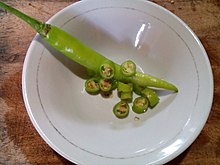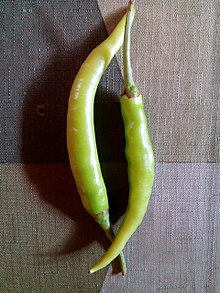Siling haba ("long chili"), espada ("sword" in Spanish), siling mahaba, siling pangsigang ("chili for sinigang"), siling Tagalog ("Tagalog chili"), and sometimes called green chili, finger chili or long pepper,[1][2] is one of two kinds of chili common to the Philippines and Filipino cuisine, the other being siling labuyo. Unlike siling labuyo, it belongs to the species Capsicum annuum.[3]
| Long chili siling haba (Tagalog) espada (Spanish) | |
|---|---|
  'Siling haba' pepper | |
| Genus | Capsicum |
| Species | Capsicum annuum |
| Cultivar | 'Siling haba' |
| Heat | |
| Scoville scale | 50,000 SHU |
The siling haba fruit grows to between 5 and 7 in (13 and 18 cm) long, and is bright light green in color.[2] While of moderate spiciness, it is much milder and less hot than siling labuyo.[4] It is an ingredient commonly used in Philippine cuisine, spicing up dishes like sinigang, dinuguan, pinangat, kilawin, paksiw, and sisig.[2]
See also
editReferences
edit- ^ "Sili". Philippine Medicinal Plants. StuartXChange. Retrieved April 4, 2020.
- ^ a b c Fenix, Micky. (May 14, 2008). "Daet's Bicol Express not as hot as Camarines Sur's version". Philippine Daily Inquirer. Archived from the original on October 5, 2008. Retrieved January 27, 2010.
- ^ Frial-McBride, Mary Grace (2016). "Extraction of resins from Capsicum annuum var. longum (Siling haba) for the study of their potential anti-microbial activities" (PDF). Journal of Chemical and Pharmaceutical Research. 8 (3): 117–127. ISSN 0975-7384. S2CID 41092438. Archived from the original (PDF) on March 24, 2018. Retrieved March 24, 2018.
- ^ Fernandez, Doreen. (1994). Tikim: Essays on Philippine Food and Culture. Anvil Publishing. p. 248. ISBN 978-971-27-0383-6. Retrieved January 27, 2010.